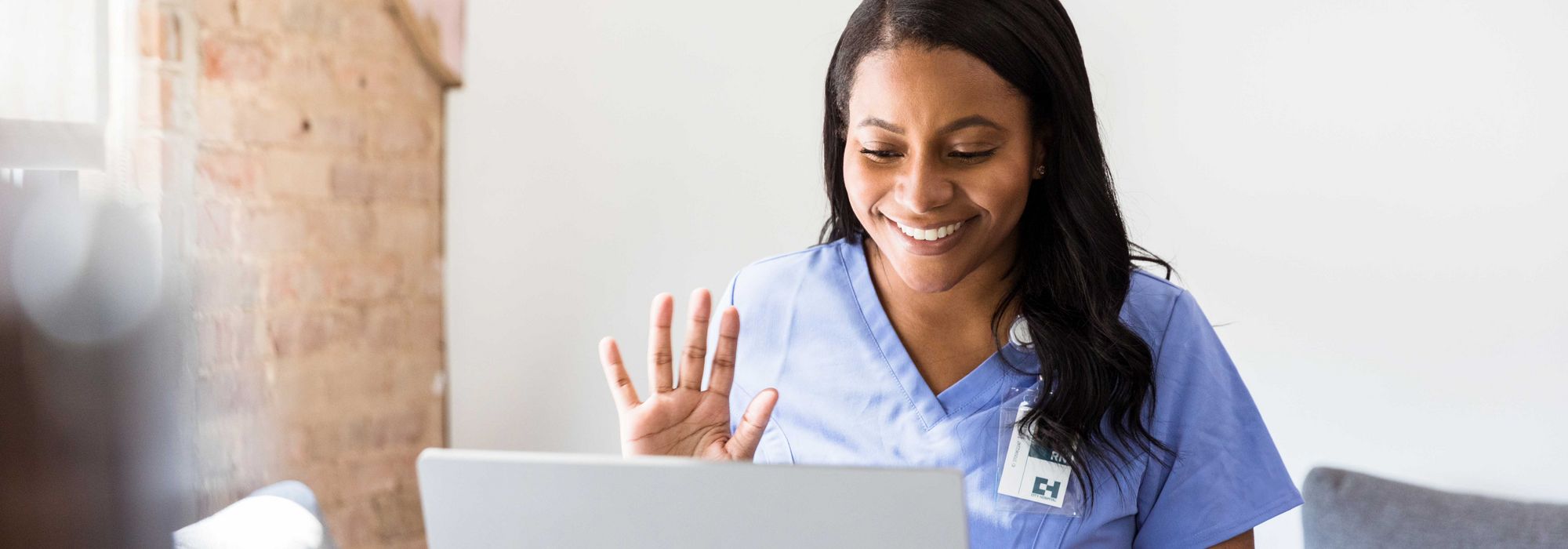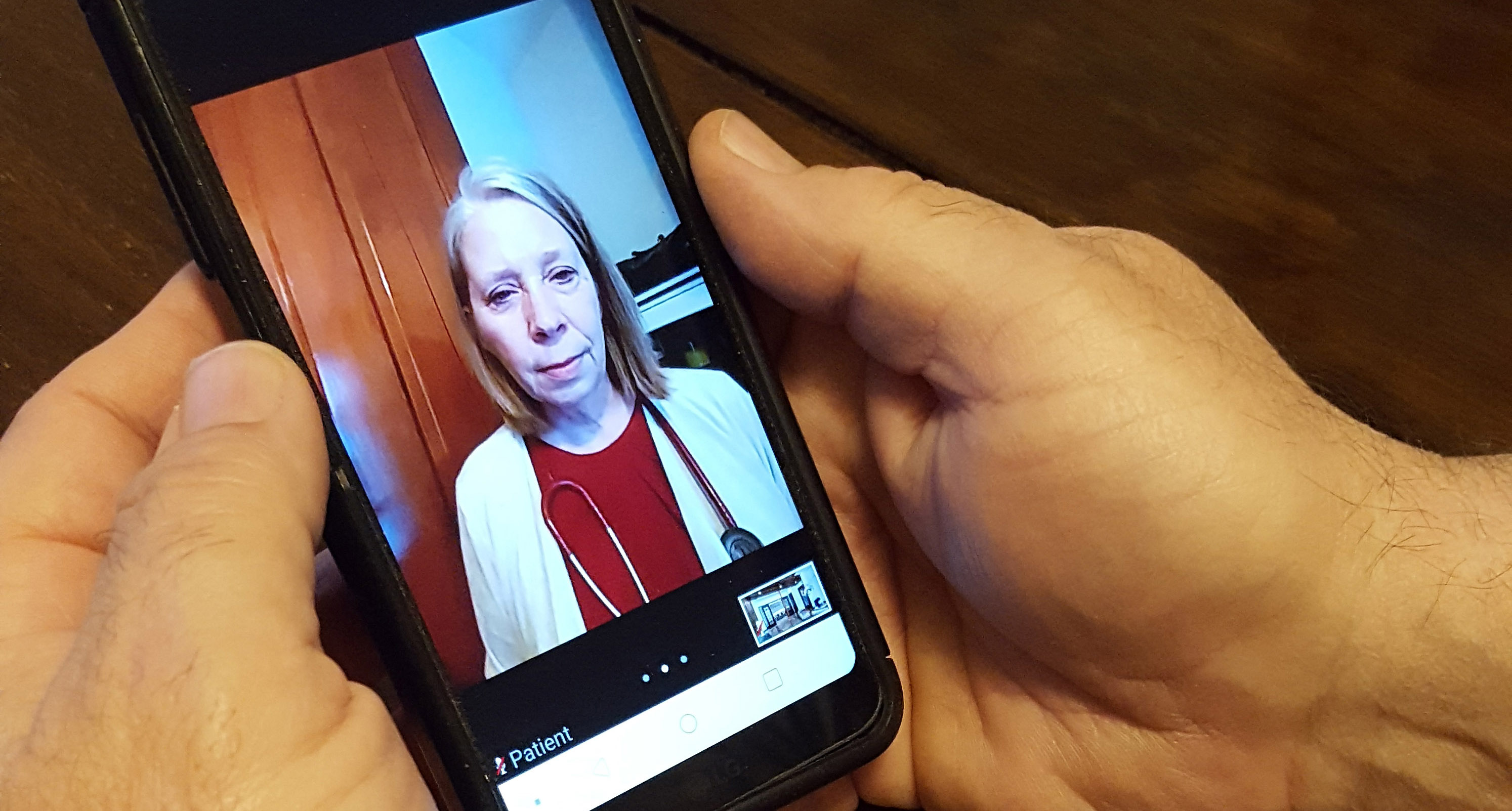
From Sick Care to Well Care
Innovative wellness program pairs nurse practitioner students with front-line nurses
by Victoria Ellwood
Self-care is not a selfish thing.
“Having a wellness partner. Having someone to check in with. Having someone to listen to you. When it comes to promoting health and well-being, those are strategies that work … and they’re worth it,” explained Alice Teall, DNP, APRN-CNP, FAANP, assistant professor of clinical nursing. “When the pandemic hit, we found ourselves asking, ‘How can we take these tools for wellness and self-care, and use them for good in a broader way?’”
This summer, the College of Nursing teamed up with Trusted Health, a career platform and staffing organization that matches nurses with jobs, to create the Wellness Partner Program. It’s a one-on-one program pairing nurse practitioner (NP) students with Trusted Health’s cadre of nurses assigned to care for hospitalized COVID-19 patients across the country. College of Nursing Dean Bernadette Melnyk, PhD, APRN-CNP, FAANP, FNAP, FAAN, and Teall received a grant from Trusted Health to support the program.
The initiative is an offshoot of an earlier collaboration last spring with Trusted Health – an emotional support hotline for its front-line nurses. The “warm line” operated from April to June, and was staffed by College of Nursing faculty, who offered encouragement and support.
“A lot of these nurses are very stressed but don’t want to ‘bother anyone’ and reach out for help,” Teall said. “The Wellness Partner Program addresses their stress, burnout and other mental health issues. It provides support wherever they need it most – whether that’s talking about their long days on the front lines or their challenges juggling work and child care, or their fears of the bringing the virus home. Sometimes just knowing someone is there to listen is enough.”
Student coaches aim to help the nurses build resilience and encourage them to engage in wellness tactics. Together, they create a plan, set goals and work on healthy behaviors – such as stress-relief activities, like mindfulness and meditation, tools for better sleep, nutrition tips, and squeezing in some exercise, Teall explained.
The Wellness Partner Program connects family practice and psychiatric NP students with Trusted Health nurses, with Teall acting as preceptor. Currently, 48 students – who gain clinical experience through their involvement – and more than 250 working nurses are on board the program that kicked off in June. A wait list of interested Trusted Health nurses will take part this fall.
Ohio State NP students complete a 6-hour training course to learn effective coaching strategies, and meet with Teall throughout the program. Each student is paired with three or four working nurses, with whom they connect over four to six weeks.
“I feel like I’m in the right place doing the right thing,” said Christopher Messmer, who has a BA in psychology from Ohio State. The U.S. Navy veteran served as a navy hospital corpsman HM3, and is pursuing a master of science in nursing degree in the psychiatric nurse practitioner specialty track through the graduate entry option. “The partnership allows me to put into action what I’ve learned at Ohio State. The college has resources for us to use, and questions to ask to get the conversation started. The goal is to help patients help themselves by sharing strategies and tools.”

Messmer is partnered with three nurses working in hospitals in Kansas and Arizona, connecting with them by video conferencing and phone calls. “Nursing is tough. It’s really stressful, and sometimes they can feel like they’re on an island,” said Messmer, whose wife is a nurse working with COVID-19 patients, too. “But the fact that these nurses have joined the partnering program is the first step. They want to feel better.”
Taylor Hale, BSN, RN, CPSN, a family practice NP student who also works full-time as a nurse at The Ohio State University Comprehensive Cancer Center – Arthur G. James Cancer Hospital and Richard J. Solove Research Institute, is partnering with three nurses. They include a travel nurse stationed in a COVID-19 tent in Florida, an ICU nurse in Chicago and an ER nurse in Cleveland. “A lot of what we do centers around self-reflection,” she said. “When was I at my best? What was I doing to feel good? What can I do now to get back to my best self?”
One of her partner nurses fits in a daily self-affirmation. “Every morning she thinks of a statement to keep in mind throughout the day, like ‘I am worthy.’ Or ‘I am doing a good job.’ Then she says it five times,” said Hale. “It helps her stay positive and centered while she works a long shift.”
It also works both ways, according to the NP students. “During this process, I’m reflecting on myself and my self-care, too,” Hale said. “If I don’t want to get up in the morning, I have to give myself a little positive self-talk. Get up. Get moving. Or if I’m stressed after my shift, I spend some time outside, being mindful, breathing in the fresh air.”
Added Messmer, “Things are tough right now. Sometimes what everyone needs most is just someone to talk to.”
The program, Teall said, is “so rewarding. We’re doing some real good and offering much-needed support.” This fall, she added, we will be expanding the program to provide wellness support for nurses who are practicing across The Ohio State University Wexner Medical Center facilities and hospitals, and extending wellness support to students who have been isolated or quarantined due to COVID-19.
Ohio State’s Psychiatric Mental Health NP Track
The College of Nursing’s Psychiatric Mental Health Nurse Practitioner specialty track prepares its graduates to provide mental health, addiction and comorbid mental health services in a range of inpatient and outpatient settings – from primary care facilities and schools to community and business settings.
The program emphasizes coursework, clinical experience and evidence-based practice; at its heart are collaborative relationships between the College of Nursing, Ohio State’s teaching hospitals and community-based mental health facilities.

Christopher Messmer joined the specialty track following his service in the military, where he worked as a pharmacy tech and EMT.
“The psych NP program is everything I wanted it to be,” he said. “It provides the tools I will need to help others, and has a team of experienced NPs who share the fundamentals we need to impact others in positive ways.”
Messmer said the program offers a broad-based educational experience. “It has a very ‘nuts and bolts’ focus on psychiatry to help us build those skill sets, but also embraces the more-holistic nursing approaches to patient care.”As part of his experience, Messner works part time at a local behavioral health center. His ultimate goal? “I’d like to work with other military vets in some capacity, since I share a special camaraderie with them,” he said.
The Wellness Partner Program is one innovative component of the College of Nursing’s focus on helping others to take great self-care and stay well. Promoting optimal health and well-being is important every day, and is especially relevant during today’s pandemic-related challenges to keep our immune systems boosted to prevent infection.
“Our strategic vision is to create a culture that makes healthy behaviors the norm, where we move from a system that concentrates on sick-care to a culture of wellness and prevention that emphasizes healthy behaviors and lifestyles,” said Bernadette Melnyk, PhD, APRN-CNP, FAANP, FNAP, FAAN; dean of the college and university chief wellness officer. “Now is the time to make wellness and prevention of acute and chronic disease a priority – for our faculty, staff, students, alumni, healthcare professionals and those in our communities. For all of us.”
Other wellness resources available from the Office of the University Chief Wellness Officer include:
- An eight-week series of wellness classes: Staying Calm in the Midst of the COVID-19 Storm. Presented live, the recorded series is available online and covers topics ranging from stressbusters and sleep to resilience, gratitude and healthy eating.
- A webinar hosted by Melnyk: Key Strategies for Relieving Anxiety During the COVID-19 Pandemic.
- An emotional fitness blog, filled with tips and skills for mental health.
- A series of virtual town halls on health and well-being, along with an online resource page for students, faculty and staff.
In this issue
- Improving Health Inequities Through Our Research
- Hotspot: New York City
- Going the Extra Mile
- From Sick Care to Well Care
- COVID-19 Challenges Inspire Solutions
- Caring & Creativity
- Evidence-based Practice
- Building Relationships with Olivia Cotton
- Young Alumni Blog
- Homecoming 2020
- Sandra Cornett
- Coping with COVID-19
